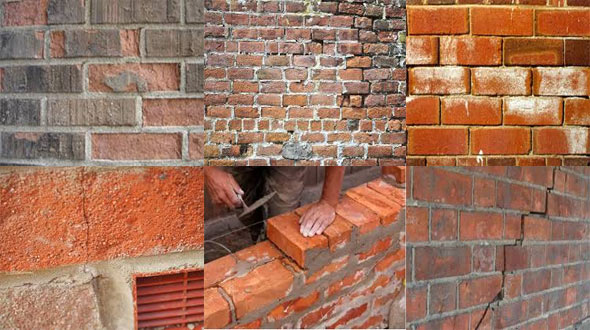Common Types of Brickwork Defects
- Concrete Cost Estimator
- Concrete Continuous Footing
- Landscape Bidding and Estimating
- Construction Cost Estimating
- Concrete and steel cost estimation
- Construction Cost Estimate Breakdown
- Construction Estimating Worksheet
- Home Construction Cost Estimate
- Estimate Pricing Sheet
- Sheet for General Contractor
- Construction Cost Estimate
- Labor Materials Cost Estimator
- Masonry Estimating Sheet
- Sheet for Building Contractor
- Construction Schedule Bar chart
- General Cost Estimator Sheet
- General Construction Estimate
- Building and Road Estimating Sheet
- Detailed expense estimates
- Door and Window Takeoff Sheet
- General Construction Cost Estimating Sheet

Generally, defects occur in brick masonry because of poor design or specification, applying sub-standard materials as well as poor standards of workmanship.
Given below, major reasons which contribute to the defects in brick masonry work.
Sulphate Attack: The following types of defects occurs owning to sulphate attack
a. Chipping and spalling of bricks and
b. Formation of cracks in joints and rendering
These types of defects exist If sulphate salts present in brick work, react to alumina content of cement mortar and with hydraulic lime in the lime mortar which may lead to raise the volume of mortar. It contributes to chipping and spalling of bricks and development of cracks in joints and rendering.
These defects normally exist in following situation;
a. exposed boundary wall
b. parapet wall
c. manhole and retaining walls (where they are exposed to moisture)
To get rid of these types of defects, proper construction detail along with standard quality materials should be chosen so the moisture can’t enter into the body of brick work.
Crystallization of Salts from Bricks: Defect occurs because of crystallization of salts from brick. It is called as efflorescence.
Existence of additional soluble salts in the brick contributes to the formation of this type of defect. When these brick keep in touch with water, the existing soluble salts get liquefied and proceeds to surface as whitish powder.
The wall becomes dull and ruins it elegant look.
This defect can be resolved by brushing and washing the wall surface on regular basis.
Decay of Implanted Iron or Steel: Due to dampness in building, decay happens in embedded iron or steel. With decay, the volume of metal is enlarged and thus crack is developed with the brickwork. Decay in steel can raise the volume of metal and it contributes to crack in brick work.
This type of defects can be resisted by covering the reinforcement with solid and water-resistant cement mortar as well as arranging a cover of 15 to 25 mm around the implanted member.
Shrinkage on Drying: Development of cracks in masonry joints contribute to the formation of defect because of shrinkage.
The bricks are absorbent material and it has susceptibility to absorb water. After absorbing water, it swells and when this absorbed water dissolves, brick gets to shrink. This shrinkage of brick leads to cracks in brick masonry joints.
The structural strength of brick work is not impacted with shrinkage cracks and it is easily resisted with the following remedies :-
a. By utilizing standard quality of brick and mortar
b. by safeguarding masonry from moisture

- Application of concrete calculator
- Roofing Calculator can streamline the roof estimating process
- House construction cost calculator
- Engineering column design excel spreadsheet
- Material Estimating Sheet with Excel
- Materials List and Cost Estimate Worksheet
- Concrete Slab Estimating Calculator Sheet
- Common types of foundations for buildings
- Online calculation of construction materials
- Estimating with Excel for the Small Contractor
- Concrete Beam Design Spreadsheet
- Virtual Construction Management app for construction
- Autodesk’s Project Skyscraper
- Reed Construction’s Reed Insight
- Manage your construction project documentation
- Costimator, the popular cost estimating software
- On Center Software for construction professionals
- Free Construction Estimating Software
- Plumbing Calc Pro
- Cost Estimate Worksheet
- HVAC Piping Quantity Takeoff Worksheet
- Construction Estimating Software Sheet
- Estimate Cost Templates
- Construction Punch List
- Construction cost estimating template consisting estimating basic
- Gantt Chart Template for Excel
- Download Civil Engineering Spreadsheets with Verification
- The Building Advisor Estimating and Budgeting Worksheet
- Spreadsheet for design of concrete bridge
- Construction Estimating Software Free








